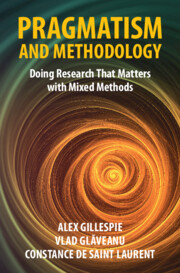Crossref Citations
This Book has been
cited by the following publications. This list is generated based on data provided by Crossref.
Heinijoki, Hennariikka
Karhula, Maarit
Vuoskoski, Pirjo
Munukka, Matti
Nikander, Riku
and
Seppanen-Jarvela, Riitta
2024.
Towards a Satisfactory Future—Multiprofessional Rehabilitation for Young Persons with ADHD or ASD.
Disabilities,
Vol. 4,
Issue. 4,
p.
918.
Zittoun, Tania
Gillespie, Alex
and
Bernal Marcos, Marcos José
2024.
Development and vulnerability across the lifecourse.
Culture & Psychology,
Vol. 30,
Issue. 4,
p.
813.
Bernal Marcos, Marcos José
Zittoun, Tania
and
Gillespie, Alex
2024.
Diaries as Technologies for Sense-making and Self-transformation in Times of Vulnerability.
Integrative Psychological and Behavioral Science,
Vol. 58,
Issue. 2,
p.
563.
Gillespie, Alex
2024.
Challenges for conceptualising otherness.
Possibility Studies & Society,
Vol. 2,
Issue. 2,
p.
245.
Gillespie, Alex
Glăveanu, Vlad
de Saint-Laurent, Constance
Zittoun, Tania
and
Bernal Marcos, Marcos José
2024.
Multi-Resolution Design: Using Qualitative and Quantitative Analyses to Recursively Zoom in and out of the Same Dataset.
Journal of Mixed Methods Research,
Lehmann, Olga
and
Wagoner, Brady
2025.
Silence is a construction: An exploratory study of people’s everyday understandings.
Culture & Psychology,
Vol. 31,
Issue. 1,
p.
72.
Wilson, Hester
Harris Roxas, Ben
Lintzeris, Nicholas
and
Harris, Mark
2025.
“The Whole Structure Is Knackered, It Could Still Explode, It Really Could”: A Mixed Methods Study of Initiatives to Increase General Practitioner Prescribing in an Opioid Dependence Treatment Program from 1970 to 2022 in New South Wales, Australia.
Contemporary Drug Problems,
Hald, E. Julie
Gillespie, Alex
and
Reader, Tom W.
2025.
Problems in Dealing with Problems: How Breakdowns in Corrective Culture Lead to Institutional Failure.
British Journal of Management,
Vol. 36,
Issue. 1,
p.
73.
Chipenda, Clement
2025.
Transformative Social Policy Through Land Reform: Women’s Economic Agency and Rural Social Change in Zimbabwe.
Journal of Asian and African Studies,
Bunt, Hannah L.
Goddard, Alex
Reader, Tom W.
and
Gillespie, Alex
2025.
Validating the use of large language models for psychological text classification.
Frontiers in Social Psychology,
Vol. 3,
Issue. ,
Heeks, Richard
Wall, P. J.
and
Graham, Mark
2025.
Pragmatist-critical realism as a development studies research paradigm.
Development Studies Research,
Vol. 12,
Issue. 1,



